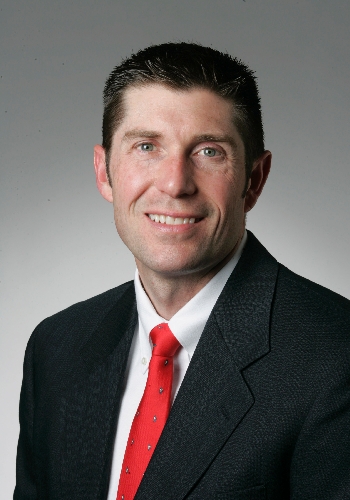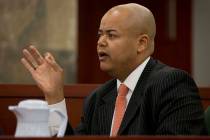Judging the Judges: Henderson jurists feel left out after few finish lengthy survey
Of 4,624 attorneys invited to rate local judges, fewer than 90 scored Henderson Municipal Court judges Douglas Hedger and Mark Stevens in the Las Vegas Review-Journal's 2011 Judicial Performance Evaluation.
That's a combined figure, with a scant 47 for Hedger and 39 for Stevens.
That's a problem in the eyes of both men, who think the biennial poll provides a good service to voters and judges but that the lack of participation is discouraging.
"We're at the end of the survey, so you can get an unfair result," Hedger said.
Lawyers who visit the evaluation website are offered the chance to rate state Supreme Court justices, District Court and Family Court judges and justices of the peace before they are asked about Municipal Court judges.
Lawyers decide which judges they will rate, and some may not persevere to the lower courts.
The three judges of Hedger's court were 86th, 87th and 88th in the batting order of 90 jurists.
With 87 percent of the attorneys who rated him in the survey saying he should be retained when he runs for re-election in 2015, Hedger's concern is more for Stevens, who scored a 64 percent retention rating, and for Diana Hampton, who garnered only 38 percent.
"With so few attorneys taking it seriously, you either come across as a really bad judge or the best judge in the world, so it can seem unfair, but it's better than nothing," said Hedger, who has been a municipal judge since 2003.
Stevens doesn't blame the survey, or the attorneys who did participate in it, but he does think attorneys' perceptions about the Henderson courthouse might lead them to wrong conclusions.
Take one lawyer's comment that, "It's hard for a judge to be objective when he spent his entire adult life putting people into jail. Stevens would implode before he put the word 'not' in front of 'guilty.' "
Before being elected in April 2007, Stevens was a prosecutor with the Henderson city attorney's office, and he spent three years working nights as a Henderson police officer while spending his days practicing civil law.
"Everybody knows I was a police officer and a prosecutor, so they think I'm biased; but what they don't know is that I was a defense attorney with JAG (Judge Advocate General) when I was in the Marine Corps."
And they definitely don't know that Stevens won an acquittal for his very first client, a Marine charged with breaking a beer bottle and using it to take out the eye of a police officer.
"One of my favorite jobs ever was being a defense attorney," he said. "I think that helps me understand the system from the defense side more than some attorneys realize, and I understand the prosecution. Both sides are crucial, but I know the system fails without zealous advocacy by defense counsel."
Stevens also believes his police background is why 24 percent of attorneys who rated him say he is less than adequate when it comes to avoiding impropriety or the appearance of it.
"I'm objective in court," he said. "If anything, I'm harder on police than defendants. If you ask the police, they will tell you I hold them to a higher standard. I'm tougher on them because I was a police officer and have higher expectations of them."
Still, he concedes his time wearing a badge undoubtedly influences his decisions, particularly after a defendant's guilt has been established.
"Every experience in life creates the person you are," he said. "That doesn't mean I'm not fair."
The primary knock against Hedger, a former chief deputy public defender in Clark County, is that he is perceived as being overly harsh on drunken driver offenders.
"I don't think that's true," he said. "In Municipal Court we get a lot of DUIs, and most of the time I go with the recommendations of the prosecutor and defense attorney."
Sometimes, Hedger said, he rejects negotiations when the defendant has an extensive criminal record.
In any event, the too-mean-to-drunken-drivers complaint is one Hedger heard in the 2009 survey. He took it to heart.
"That's why I started drug court."
Stevens' best score was for being free of religious bias in his conduct, with 58 percent saying he was more than adequate. But 37 percent gave him a less-than-adequate assessment on appropriate rulings.
"I think my rulings are usually appropriate to the respective case," Stevens said. "Sometimes attorneys don't like my rulings, but that doesn't mean they were wrong or inappropriate."
Hedger's best score was for being courteous, where 74 percent rated him "more than adequate." His worst score was for appropriate rulings, where 16 percent called him less than adequate.
Contact Doug McMurdo at
dmcmurdo@reviewjournal.com or 702-224-5512.
Judging the Judges - 2011





























